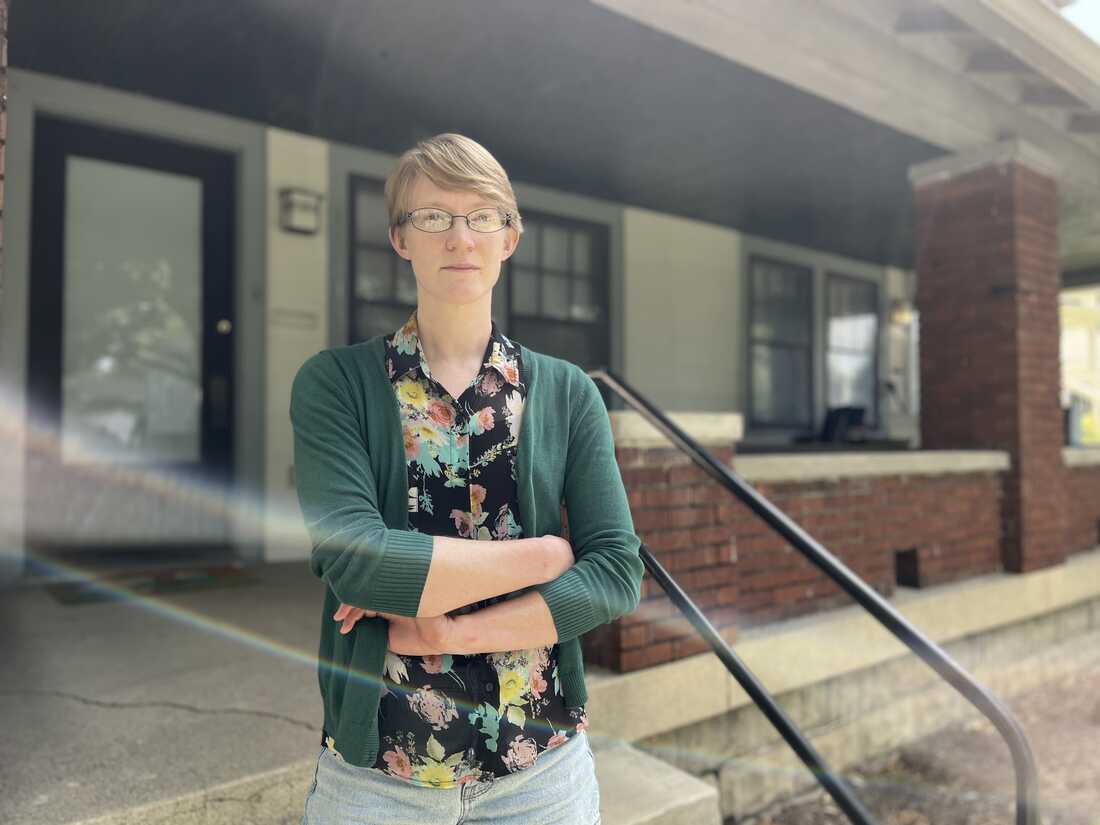Allison Case is a family medicine physician who is licensed to practice in both Indiana and New Mexico. Via telehealth appointments, she’s used her dual license in the past to help some women who have driven from Texas to New Mexico, where abortion is legal, to get their prescription for abortion medication. Then came Indiana’s abortion ban.
Farah Yousry/ Side Effects Public Media
hide caption
toggle caption
Farah Yousry/ Side Effects Public Media
Allison Case, a family medicine physician, spends much of her time working in a hospital where she delivers babies and provides reproductive health care services, including abortions.
Case lives and works in Indiana, where a ban on most abortions took effect for a week in late September until a judge temporarily halted the ban. The state has since appealed the judge’s order and asked the Indiana’s high court to take up the case. Meanwhile, Case is also licensed to practice in New Mexico, a state where abortion remains legal.
Before Indiana’s abortion ban took effect, Case would use her days off to provide reproductive health services, including abortion care, via telemedicine through a clinic that serves patients in New Mexico. Many of them travel from neighboring Texas, where abortion is banned.
Some travel solo, she says, and others have their children with them.
“Some people are [staying in] hotels, others might have family or friends they can stay with, some are just sleeping in their cars,” Case says. “It’s really awful.”
During a telemedicine appointment, doctors, nurses or other qualified health professionals review the medical history of the patient and ensure eligibility for a medication abortion. They give the patient information about how the two pills work, how to take them, what to look out for as the body expels the pregnancy, and when to seek medical attention in the rare instance of complications. The medications are then mailed to the patient, who must provide a mailing address in a state where abortion is legal.
In the U.S., more than a dozen states severely restrict access to abortion, and almost as many have such laws in the works. Across the country, since Roe v. Wade was overturned, clinics that do provide abortions have seen an increase in demand. Many clinics rely on help from physicians out of state, like Case, who are able to alleviate some of the pressure and keep wait times down by providing services via telemedicine.
But as more states move to restrict abortion, these providers are finding themselves navigating an increasingly complicated legal landscape.
Is abortion by telemedicine legal? Experts differ
Medication abortions work for most people who are under 11 weeks pregnant, and research suggests medication abortion via telemedicine is safe and effective. Yet many states have enacted legislation to ban or limit access to telehealth abortions.
But it’s not always clear what that means for doctors like Case who are physically located in a state with abortion restrictions but have a license that enables them to provide care via telehealth to patients in states where it is legal.
Case says she has consulted several lawyers about the legality, and none of them had a concrete answer for her.
“One lawyer was like, ‘If anyone tells you they think they know [or] they have certainty about this stuff, they’re out of their mind’,” she says.
In many states, patients seeking a telehealth abortion have to be physically present in a state where telemedicine abortion is legal, even if it’s just to have a brief virtual consultation with a provider, who may be located in an entirely different state.
These providers are finding themselves in a murky gray area legally, having to weigh how much risk they’re willing to assume to care for their patients, or consider halting this aspect of care altogether.


Katherine Watson, a law professor and medical ethicist at Northwestern University Feinberg School of Medicine in Chicago, says this is uncharted territory.
“The stakes are so high. We’re talking about something that’s a protected right in one state and a felony in a sister state,” Watson says. “And the map is a patchwork. So this is an absolutely radical change.”
People have to understand the distinction between the letter of the law and the enforcement environment, she says. Even if the law does not explicitly criminalize what doctors like Case do, the enforcement environment can ensnare some of them in legal trouble.
“In a draconian enforcement environment, you may not have violated the letter of the law. But creative prosecutors may look for a reason to persecute you,” Watson says.
There is no slam-dunk argument prosecutors can use, she says, but in a charged political environment, there is a real risk. Look no further than Dr. Caitlin Bernard, an Indiana OB-GYN who spoke out about a legal abortion she provided earlier this summer to a 10-year-old rape victim from Ohio; Bernard was vilified and publicly accused of wrongdoing by the state’s attorney general.
Providers have to weigh the risks
Case works with Whole Woman’s Health, a reproductive health clinic that offers telemedicine abortion in five states: Illinois, Minnesota, New Mexico, Virginia and Maryland. The organization does not have a brick and mortar clinic in some of these places, but it works with providers who have medical licenses there to staff virtual appointments.
Whole Woman’s Health’s president and CEO, Amy Hagstrom Miller, says she speaks with providers about the risks they face working for the clinic. She suspects the lack of clarity in state laws is by design, intended to “scare people away from providing safe abortion care.”

With Indiana’s recent abortion ban now on hold, for now, Case says she is looking into continuing to provide telemedicine abortions. But if the ban takes effect again, she says, she will reluctantly stop those services. The risk is too high.
Farah Yousry/ Side Effects Public Media
hide caption
toggle caption
Farah Yousry/ Side Effects Public Media

With Indiana’s recent abortion ban now on hold, for now, Case says she is looking into continuing to provide telemedicine abortions. But if the ban takes effect again, she says, she will reluctantly stop those services. The risk is too high.
Farah Yousry/ Side Effects Public Media
The clinic has already stopped working with providers based in Texas because of the way the abortion law there allows for anyone — even someone not personally affected — to sue anyone who performs, aids or intends to aid in an abortion. That opens the door for political, cultural and even personal grievances to interfere with health care providers’ work.
“Just because you comply with the law doesn’t mean that anti-abortion people won’t come after you and try to vilify you and make your life difficult,” Hagstrom Miller says.
In late August, on one of Case’s days off from her job caring for Indiana patients, she sat at her laptop as one of her cats nestled in her lap quietly and her first telemedicine abortion patient logged on.
The woman was a pregnant student from Texas who was sitting in her car. The camera displayed only the top half of her face. She had driven for hours to New Mexico seeking a prescription for abortion pills.
Case walked her through what to expect, explaining that abortion pills stop the pregnancy from progressing and prompt the body to eject the embryo within a few hours.
“It depends on the person, but many people describe it as a heavy period,” Case told the young woman.
The patient asked for a medical note to excuse her from school, but asked that the note not mention that she’d had an abortion.
It’s women like these who motivate Case to take on telemedicine abortion cases.
With Indiana’s abortion ban now on hold, Case says she is looking into continuing to provide telemedicine abortions. But if the ban takes effect again, she says, she will stop those services. The risk is too high.
If more providers in these states decide the risk is too high, Hagstrom Miller says, the clinic is ready to divert the patient load to providers in states where abortion remains legal and protected.
For her part, Case says, if the patient volume is high enough, she might consider driving over the state border, to neighboring Illinois, so she can continue to provide these telemedicine services.
“I just think it’s a crazy thing to think I will drive 1 1/2 hours to Illinois to use my New Mexico [medical] license to help people driving from Texas to New Mexico to get their abortion,” she says. “It’s just, like, madness.”
This story comes from NPR’s health reporting partnership with Side Effects Public Media, Midwest Newsroom and Kaiser Health News (KHN).















